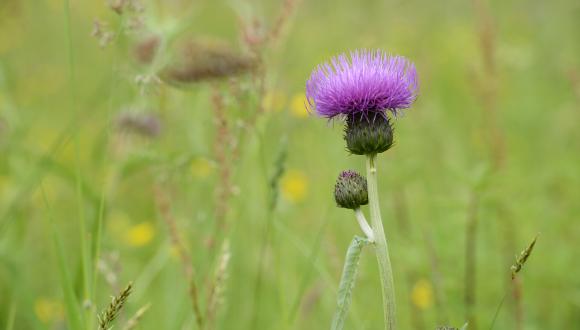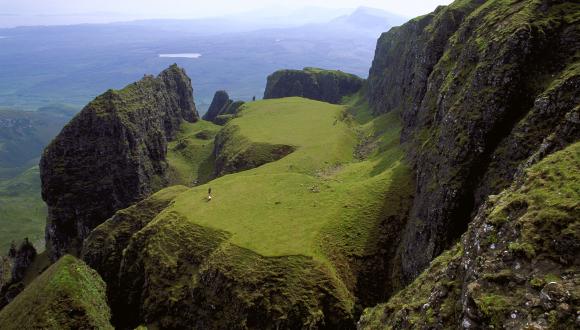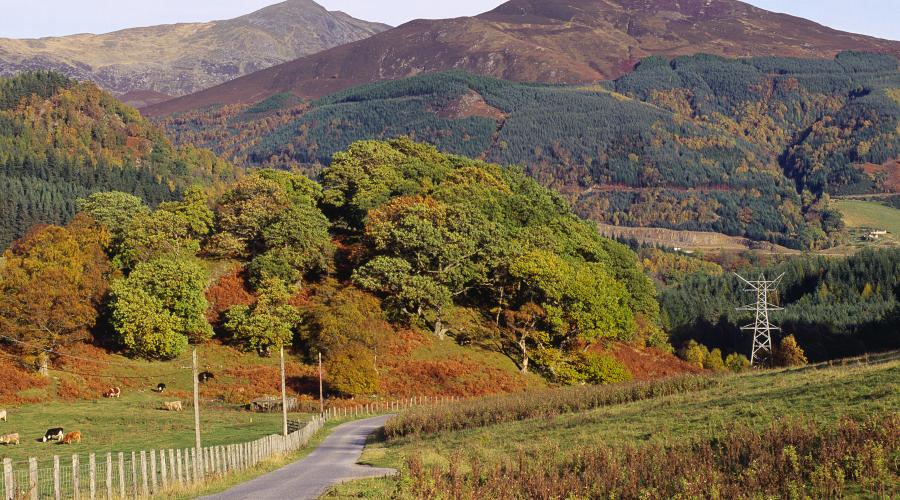
Ecosystem services - nature’s benefits
Nature provides us with natural resources and raw materials, insect pollination and soil formation, and it improves our health and well-being.
What are Ecosystem Services?
Nature is essential for human life. Nature provides us with water, clean air and food, and raw materials for medicines, industry and buildings. Our crops rely on insect pollination and the complex biological processes that create soil. Enjoying parks, landscapes and wildlife improves our health and well-being.
All of these benefits, known as ecosystem services, depend on a healthy environment.
Ecosystem Services are the direct and indirect contributions ecosystems (known as natural capital) provide for human wellbeing and quality of life.
This can be in a practical sense, providing food and water and regulating the climate, as well as cultural aspects such as reducing stress and anxiety. In fact, the vast number of services provided by ecosystems can be categorised into more manageable groups of: provisional; regulating; cultural; and the slightly more ambiguous, supporting services.
These services provided by ecosystems lead to benefits received by humans in the form of security, goods and materials, health and wellbeing.
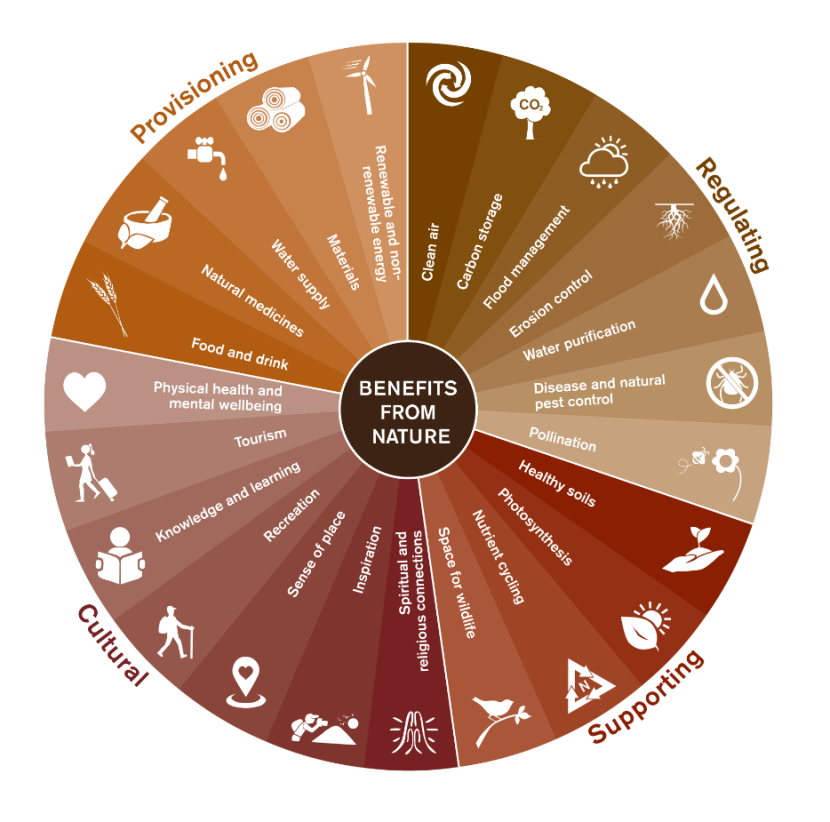
The Benefits from Nature Wheel shows the ecosystem services we gain from our terrestrial environment. Download a PDF version of the Ecosystem Land wheel.
Benefits from Nature
Provisioning
- Food and drink
- Natural medicines
- Water supply
- Materials
- Renewable and non-renewable energy
Regulating
- Clean air
- Carbon storage
- Flood management
- Erosion control
- Water purification
- Disease and natural pest control
- Pollination
Supporting
- Healthy soils
- Photosynthesis
- Nutrient cycling
- Space for wildlife
Cultural
- Spiritual and religious connections
- Inspiration
- Sense of place
- Recreation
- Knowledge and learning
- Tourism
- Physical health and mental wellbeing
Provisioning – these are tangible goods that people can harvest from the environment such as food, wood and fibre, water and fuel.
Regulating – these are regulating services that occur in the ecosystem that lead to benefits such as climate regulation, flood management, and water filtration.
Cultural – these include ways in which nature impacts people’s health and wellbeing through recreational and education benefits as well as improving mental health and building spiritual connections.
Supporting – ecosystems could not function without supporting services, such as the nutrient cycle, soil formation and habitat provision for biodiversity, forming the basis for the other three types of services.
Underpinning all these services is biodiversity.
Following an ecosystem approach means understanding these connections, and taking account of ecosystem services in how we manage land, freshwater and sea.
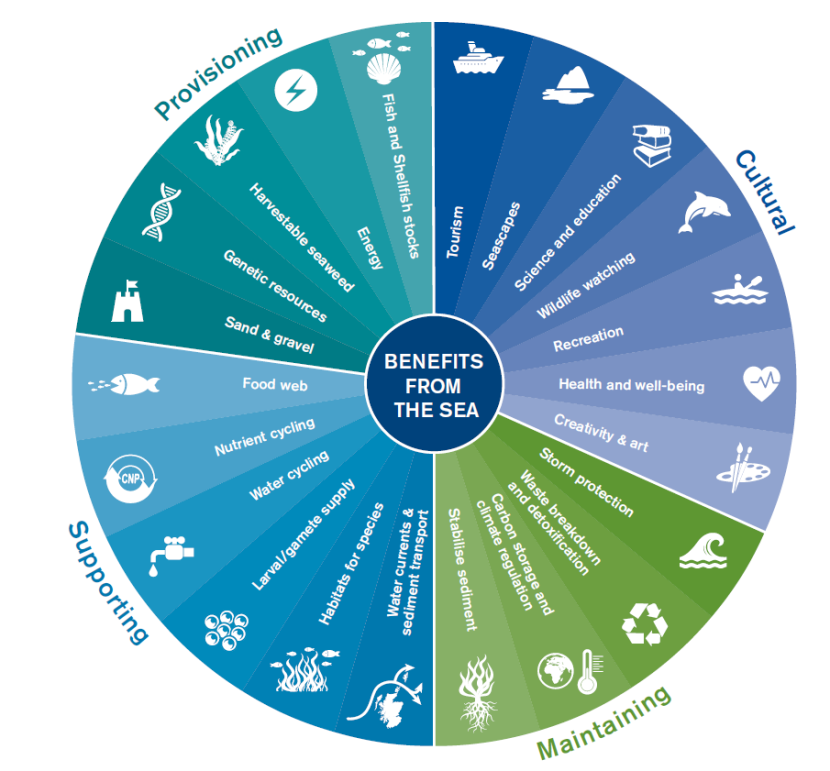
The Benefits from the Seas Wheel shows the ecosystem services we gain from our marine environment. Download a PDF version of Ecosystem Seas wheel.
Benefits from the Sea
Provisioning
- Genetic resources
- Sand & gravel
- Harvestable seaweed
- Energy
- Fish and Shellfish stocks
Cultural
- Tourism
- Recreation
- Wildlife watching
- Science and education
- Seascapes
- Health and well-being
- Creativity & art
Maintaining
- Storm protection
- Waste breakdown and detoxification
- Carbon storage and climate regulation
- Stabilise sediment
Supporting
- Food web
- Nutrient cycling
- Water cycling
- Larval/gamete supply
- Habitats for species
- Water currents & sediment transport
Valuing Ecosystem Services
We all benefit from ecosystem services whether we recognise them or not. Most of us appreciate the ecosystem services that we come across in our daily lives, even if we don’t know their true value.
The loss of nature affects our economy, our culture and our daily life as individuals. Investing in nature – biodiversity and ecosystems, geodiversity and landscapes above and below the water – will help improve the quality of these services as well as securing them for future generations.
It is very difficult to put an economic value on nature and the services it provides. The overall value of nature to people and its economic importance have been shown by two studies:
While difficult to determine, working out an economic value for nature can help to highlight the importance of nature, and nature-based solutions, to our society and economy and ensure it is included decision-making.
For example:
- Scotland’s natural capital is worth at least £196bn, supporting 240,000 jobs.
- Insect pollination services in Scotland are valued at an estimated £43 million per year.
- Scotland’s beaches and salt marshes protect £13bn of coastal buildings and infrastructure, compared to £5bn protected by engineered sea walls.
This video looks at the benefits that wetlands provide to society and highlights historical and future uses of wetlands that will also benefit the biodiversity of wetlands.
It covers water purification, flood management, thatching, grazing and fen management. Produced by NatureScot with RSPB Scotland.
The National Ecosystem Assessment shows that since the 1950s, changes to Scotland’s natural environment have led to a decline in the overall benefits from nature.
For nature, there have been adverse changes in:
- land use;
- air, water and soil quality;
- wildlife populations; and,
- climate and weather
Many of these changes are driven by climate change and have both international and localised consequences for ecosystem services and how they benefit people. To look after nature, we must work with nature rather than against it, and work together, across all sectors, to make the most of nature’s benefits and build a sustainable future for Scotland.
2020VISION's new film commissioned by the Cairngorms National Park Authority and Forestry Commission Scotland.
Find out more about ecosystem services
Find out more on the social and economic benefits of nature
Read our report on testing the Natural Capital approach on NatureScot land which looks to estimate an economic value of our ecosystems and the services they provide.
The Natural Capital Asset Index analyses the quality and quantity of terrestrial habitats, according to their potential to deliver ecosystem services now and in the future.
